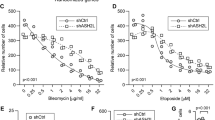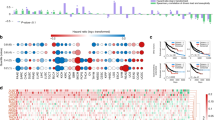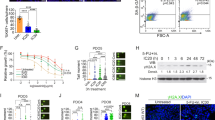Abstract
Teratocarcinomas are tumors that arise from primordial germ cells and are readily curable with DNA-damaging chemotherapeutic drugs. Teratocarcinoma cells ex vivo in tissue culture are also relatively chemosensitive and undergo apoptotic death in response to DNA damage. We have previously hypothesized that the observed sensitivity of this tumor type to DNA damage is related to high basal expression of wild-type p53 protein. We have now addressed this issue by characterizing the DNA damage response of isogenic teratocarcinoma cells that differ only in their level of expression of wild-type p53 protein. We find a clear p53 dose-response relationship in these cells for rapid apoptosis following DNA damage that correlates with diminished colony formation in clonogenic survival assays. These results suggest that strategies to increase basal wild-type p53 protein expression prior to treatment with DNA-damaging drugs may improve curability in other tumor types.
This is a preview of subscription content, access via your institution
Access options
Subscribe to this journal
Receive 50 print issues and online access
$259.00 per year
only $5.18 per issue
Buy this article
- Purchase on Springer Link
- Instant access to full article PDF
Prices may be subject to local taxes which are calculated during checkout




Similar content being viewed by others
References
Almon E, Goldfinger N, Kapon A, Schwartz D, Levine AJ, Rotter V . 1993 Dev. Biol. 156: 227–235
Brown JM, Wouters BG . 1999 Cancer Res. 59: 1391–1399
Burger H, Nooter K, Boersma A, van Wingerden K, Looijenga L, Jochemsen A, Stoter G . 1999 Int. J. Cancer 81: 620–628
Chresta CM, Masters JRW, Hickman JA . 1996 Cancer Res. 56: 1834–1841
Corbet SW, Clarke AR, Gledhill S, Wyllie AH . 1999 Oncogene 18: 1537–1544
Eid H, Van der Looij M, Institoris E, Ceczi L, Bodrogi I, Olah E, Bak M . 1997 Anticancer Res. 17: 2663–2670
El-Deiry WS, Tokino T, Velculescu VE, Levy DB, Parsons R, Trent JM, Lin D, Mercer WE, Kinzler KW, Vogelstein B . 1993 Cell 75: 817–825
Flaman JM, Frebourg T, Moreau, V ., Charbonnier F, Martin C, Chappuis P, Sappino AP, Limacher JM, Bron L Benhatter J, Tada M, Van Meir EG, Estreicher A,, Iggo RD . 1995 Proc. Natl. Acad. Sci. USA 92: 3963–3967
Hale T, Braithwaite A . 1995 Nucleic. Acids Res. 23: 663–669
Houldsworth J, Xiao H, Murty V, Chen W, Ray B, Reuter V, Bosl G, Chaganti R . 1998 Oncogene 16: 2345–2349
Lutzker S . 1998 APMIS 106: 85–89
Lutzker S, Barnard N . 1998 Mol. Med. Today 4: 404–411
Lutzker S, Levine AJ . 1996 Nature Med. 2: 804–810
Maltzman W, Czyzyk L . 1984 Mol. Cell. Biol. 4: 1689–1694
Nicol C, Harrison M, Laposa R, Gimelshtein I, Wells P . 1995 Nature Genet. 10: 181–187
Oliner JD, Kinzler KW, Meltzer PS, George D, Vogelstein B . 1992 Nature 358: 80–83
Roy B, Reisman D . 1996 Oncogene 13: 2359–2366
Sabapathy K, Klemm M, Jaenisch R, Wagner E . 1997 EMBO J. 16: 6217–6229
Schmid P, Lorenz A, Hameister H, Montenarh M . 1991 Development 113: 857–865
Schmidt-Kastner P, Jardine K, Cormier M, McBurney M . 1998 Oncogene 16: 3003–3011
Shieh S-Y, Ikeda M, Taya Y, Prives C . 1997 Cell 91: 325–334
Sheih S-Y, Taya Y, Prives C . 1999 EMBO J. 18: 1815–1823
Unger T, Juven-Gershon T, Moallem E, Berger M, Sionov RV, Lozano G, Oren M,, Haupt Y . 1999 EMBO J. 18: 1805–1814
Wu X, Bayle JH, Olson D, Levine AJ . 1993 Genes Dev. 7: 1126–1132
Zamble D, Jacks T, Lippard S . 1998 Proc. Natl. Acad. Sci. USA 95: 6163–6168
Acknowledgements
We thank Dr Moshe Oren (Weizmann Institute) for the murine p53 genomic clone. This work was supported by a grant from the Foundation of the University of Medicine and Dentistry of New Jersey. SG Lutzker is a Pfizer Scholar.
Author information
Authors and Affiliations
Rights and permissions
About this article
Cite this article
Lutzker, S., Mathew, R. & Taller, D. A p53 dose-response relationship for sensitivity to DNA damage in isogenic teratocarcinoma cells. Oncogene 20, 2982–2986 (2001). https://doi.org/10.1038/sj.onc.1204394
Received:
Revised:
Accepted:
Issue Date:
DOI: https://doi.org/10.1038/sj.onc.1204394
Keywords
This article is cited by
-
Strong apoptotic response of testis tumor cells following cisplatin treatment
International Urology and Nephrology (2023)
-
Biological indicators of chemoresistance: an ex vivo analysis of γH2AX and p53 expression in feline injection-site sarcomas
Cancer Cell International (2018)
-
p53 induction and cell viability modulation by genotoxic individual chemicals and mixtures
Environmental Science and Pollution Research (2018)
-
Der Stellenwert der Targeted-Therapie beim Hodentumor
Der Urologe (2008)
-
Molecular portrait of cisplatin induced response in human testis cancer cell lines based on gene expression profiles
Molecular Cancer (2007)



